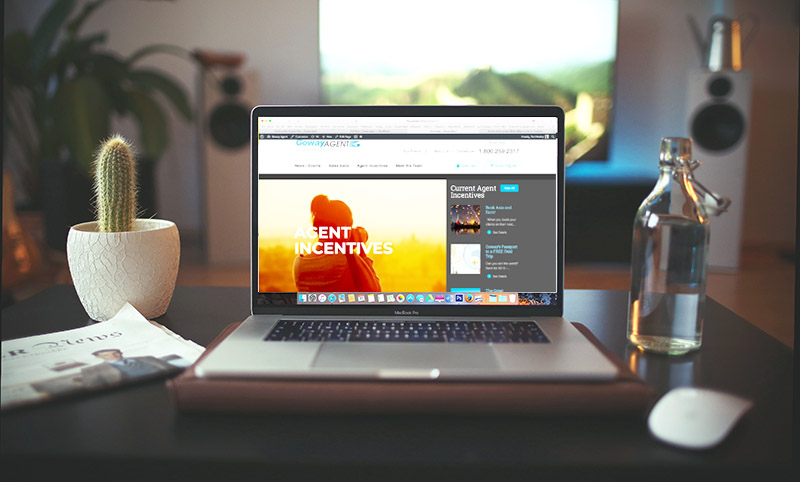Nine Things to Fix on Your Travel Agent Website


Your website is the face you present to the online world. It needs to be readable, friendly, on-topic, trustworthy, and hook visitors into wanting to know more.
This article is not going to turn you into a professional website designer or developer. Depending on your agency’s budget or time demands, you may certainly wish to hire one. But if that’s not an option, here are some hints about the basic presentation, and where to start with a good agency website.
1 – Use Dark Text on a Light Background
There are certain types of businesses that benefit from using a dark background with white text on their websites since they’re trying to create a specific atmosphere for their brand. Think mystery writers and alternative musicians or clothing lines. You’re selling travel experiences, and while you may have a couple of ‘dark’ products on offer, you’ll generally want to project an upbeat, vacation-ready tone. Light background colours that serve your text are your best bet, ideally served with strong photographs that really capture your destinations and products. Besides tonal issues, clear, dark text on a light or white background is just easier to read.

2 -Too Much of a Good Thing
Speaking of being easy to read, you may be the expert on a specific destination or style of travel, but don’t share all that wisdom at once, especially not on your website. A good amount of blank space on your site makes it much easier to read and lets any images do the heavy lifting for you. Your website should offer glimpses of your expertise and establish you as professional and reputable, with as little reading (ie: visitor effort) as possible.
3 – Raise the Bar on Those Holiday Snaps
Since your photos are going to do a lot of the talking, make sure they’re good ones. Don’t overdo the photos with you in them. Keep it to one or two, and make sure one of them is on your ‘About Me/Us’ page if you have one. If you have a particular specialty, make sure it’s the focus of most of your photos, especially the most prominent ones.


4 -Test Those Links
It sounds obvious, but you’d be surprised how many professional websites forget to test their internal and external links. Test every link on your site. Do they all lead where they’re supposed to? Check again and be sure. Check back on any external links from time to time to make sure they’re still current.
5 – How Can I Reach You?
As with your links, double-check your contact information. Make sure it’s correct. Make sure your email address operates as a link. Ensure these details are easy to find as well. Nothing is more infuriating on an interesting website than not being able to contact the business behind it. If your e-newsletter is an important part of your online marketing, make it easy and practical to voluntarily subscribe to it.


6 – Looking Good on the Small Screen
While you’re making sure everything works, bring up your site on a smartphone and a tablet. Ideally, try it on several different types. Does it display correctly? Most basic web templates should adapt your site to display well on a small touch screen but check for yourself. Take note of any links that aren’t displaying properly, along with any text that’s overlapping or cluttered. If people tap through to your site from an online ad on their phone, they’ll decide within seconds how professional it is based on its appearance and usability. You’ll want to make a good impression. Also, check if your phone number is displaying as a link in case visitors want to call you instantly. You may need to configure the number to display the country code. (ie: +1 followed by the number).
7 – Who Do You Link To?
Online marketing is a social activity, and not just on social media. Even if your agency is a ‘one stop shop for travel, think about whether you want to link to certain resources from your website. These might be some relevant favourite travel blogs or even other agencies whose products complement, rather than compete with yours. Don’t just give away free links, however. Let the site’s owner know you’re interested in exchanging links, and have an attractive, professional-looking link button or banner ready for such exchanges.
8 – Don’t Be Annoying
You want users to enjoy being on your site, and nobody enjoys closing multiple pop-ups while they’re trying to read or find information. Limit it to maybe one, and make it relevant to your company, not an ad for someone else. Having ads that cover your content is another big no-no that undoes all your hard work.


9 – Decide if You Need a Web Designer
Be honest about this, not foolish. Does your site need features complicated enough to warrant a web designer’s input? How much of your business will be conducted online? Is your website about direct sales? Information? Or just a quick introduction to your agency? What tools do you want to use that may require specific expertise? Shop around and familiarise yourself with common page-building sites and web tools. Consider the time required to learn how to use them, and compare it to the cost of hiring a professional. Only you know what kind of site is right for your agency, so think carefully about whether some professional input will be worth the investment.


